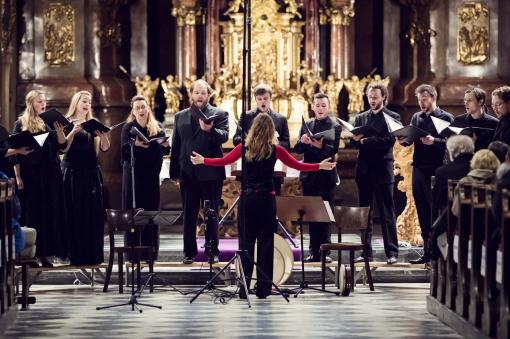The mystical cantata Musikalische Exequien by Heinrich Schütz, the greatest composer of the era before Bach, will be performed by the Czech Ensemble Baroque. This work will be confronted with another two-chorus motet at the concert, but this time written by an almost unknown author, Johannes Schimrack (or Ján Šimrák in Slovak). The concert will take place in the Church of St. Michael.
Mystical burial motet of the most famous German pre-Bach music composer Heinrich Schütz as opposed to his already forgotten Slovak contemporary Ján Šimrák – this will be the second concert of the 8th Brno season of Bacha na Mozarta! [Bach on Mozart!]. The compositions will be performed by Czech Ensemble Baroque Choir with choirmaster Tereza Válková and guest-appearing Slovak ensemble Le nuove musiche with artistic director Jakub Mitrík. As soloists will appear Pavla Radostová, Lucie Netušilová Karafiátová, Martin Ptáček, Jakub Kubín, Tomáš Kočan, Filip Novotný and Jiří Miroslav Procházka; theorba will be played by Jakub Mitrík, organ by Marek Čermák and viola da gamba by Mateusz Kowalski. The concert will take place today, 16 October at 7:30 pm in the Church of St. Michael.
Heinrich Schütz composed this famous work for an important occasion, the funeral of his sovereign Heinrich Posthumus Reuß. Of the three parts to be included in the three different parts of the Requiem, the first is based on numerous passages from the Bible, followed by a two-chorus motet related to the text of the sermon and confession of Simeon's faith "Lord, Now You Can Release Your Servant in Peace", to which a remote choir answers "Blessed Be the Dead"– as if from heaven.
Ján Šimrák was a Slovak composer of the first half of the 17th century. Already during his time in Spišské Podhradie he was a respected composer and praised by contemporary sources as an excellent organist. At the end of the 17th century, after violent recatholicisation, his work fell into oblivion and was revived only by modern musicological research. The 54 compositions that have been preserved to date include mainly larger polyphonic works for 8, 12- to 20-voice vocal or vocal-instrumental ensembles. Such is also the motet Jauchzet dem Herren.












No comment added yet..